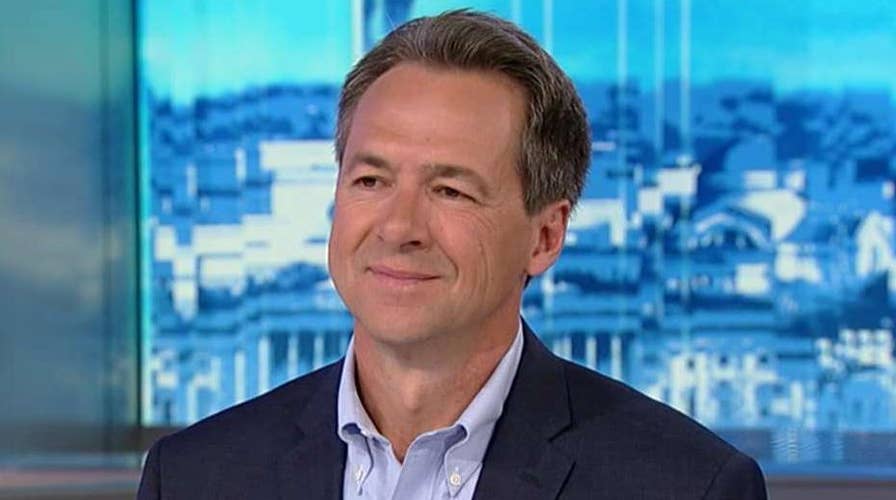Montana Gov. Steve Bullock joins the 2020 Democratic presidential primary field
2020 Democratic hopeful Gov. Steve Bullock says what sets him apart from the other candidates is he talks to people about what matters to them.
MANCHESTER, NH – Montana Gov. Steve Bullock won’t be on the stage when the first round of Democratic presidential primary debates takes place on consecutive nights next week in Miami.
Bullock, who was the second to last candidate to jump into the White House race, failed to reach either of the Democratic National Committee's thresholds to qualify for the debates.
BIDEN, SANDERS, TO STAND SIDE-BY-SIDE DURING FIRST ROUND OF DEMOCRATIC PRIMARY DEBATES
The governor, campaigning in the first-in-the-nation presidential primary state of New Hampshire, told Fox News on Friday that while he was “disappointed” he didn’t make the cut, he's qualified for the second round of debates – which will be held late next month in Detroit.
And he took aim at the DNC, calling its criteria “problematic.”
With a record-setting field of nearly two-dozen Democratic White House hopefuls, the DNC’s keeping the first two rounds of debates to 20 candidates – 10 each night on consecutive days. The DNC’s criteria for making the stage included reaching 1 percent in three polls recognized by the national party committee, or receiving contributions from a minimum 65,000 unique donors as well as 200 unique donors in at least 20 states.
Bullock thought he had reached the polling criteria, but one of the three surveys he was including was not accepted by the DNC.
“We’re certainly disappointed in the DNC’s decision not to have me in the first because initially I made three qualifying polls -- but then they discounted one of them.”
And his late entry into the race – delayed as he fought successfully to renew Montana’s Medicaid Expansion program during this year’s legislative session – gave him little time to meet the fundraising threshold.
“I only got in here five weeks ago and if I had to choose between getting health care for 100,000 people or chasing 100,000 donors, easiest decision I’d ever make.”
While 20 of his rivals are going to be in Florida, Bullock will be headlining televised town halls in New Hampshire and Iowa, the first state to vote in the presidential primary and caucus calendar.
“Instead of being in Miami, I’m actually going to be talking to voters,” he highlighted.
DNC RAISES THRESHOLDS FOR THIRD AND FOURTH ROUND OF DEBATES
The DNC’s upping the ante to make the third and fourth rounds of debates, which will be held in September and October. Candidates must reach at least two percent in four qualifying polls as well as also receive contributions from a minimum 130,000 unique donors, including 400 unique donors in at least 20 states.
Bullock considers those thresholds troubling.
“We’re 230 some days out before any voter expresses their preference. And the way that this has always worked is – even with large fields – it’s New Hampshire, it’s Iowa, it’s the early states that winnow down that big field to a small one,” Bullock emphasized. “So I’m not sure that the rules are the best, certainly when it comes to voters.”
“It’s made it some ways that the rules seem it’s more important to chase small donors that it is actually to talk to individuals, which I think is problematic,” the candidate added.
But Bullock appears resigned to the new thresholds, saying “it is what it is, at least for now.”
The progressive governor in a red state, as he frequently does, pointed to his 2016 re-election victory.
“He (Republican President Donald Trump) took Montana by 20 (percentage points). I won by four (points). Twenty-five to thirty percent of my voters voted for Donald Trump. And it’s not because I ran to the center,” he highlighted. “I think the greater message of this is that if we can’t connect to both bringing out our base and bringing back some of the voters we lost, we’re not going to win.”
And touting his ability to work across the aisle, Bullock spotlighted “I’m out there and I’m going to be out there every day saying we’ve got to win back places that we lost last election cycle. I’m the only one in this field that won in a Trump state. People want government to actually work. Even with a 60 percent Republican legislature we’ve been able to get meaningful things done along the way. And I think being outside of Washington DC makes a difference in what I can present.”
And taking aim at some of his rivals for the 2020 nomination, Bullock argued that “a lot of people talk about it (bipartisanship). And Washington DC at times becomes a place where talking is a replacement for doing. And I’m the one that’s actually done it along the way.”





